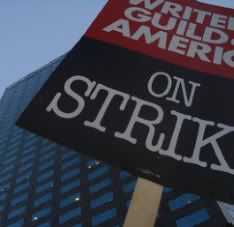
The two top WGAe/w officers weigh in on the accomplishments of the WGA strike, six months after the fact:
“Would I rather not have gone on strike?” [WGAe President Michael] Winship asked rhetorically. “Yes, but we don’t live in a perfect world. We had no alternative because we had gotten to the point where we weren’t negotiating -- all they were doing was saying no -- and we had to show them that we were serious about our intentions.” ...
“We had a negotiating committee that was stocked with a lot of working writers, and it looked as if the companies’ plan was to keep the TV season going right through the hiatus, along with going ahead with a lot of movies,” [WGAw President Patric] Verrone recalled. “And at that point, it looked like the DGA and AFTRA would have been willing to go ahead and make a deal. So had we extended, we would have been out on strike with SAG and there would have been plenty of stockpiled material.” ...
Winship said: “When you’re dealing with an asymmetrical organization like the AMPTP, the element of surprise is enormously important. We also had to deal with the realization that there was an enormous amount of stockpiling going on. There were about 150 movies going into production, and the networks were approving series without pilots. So hindsight being 20-20, it was the right thing to do.” ...
After the fact, there have been a hundred post mortems: Was the strike effective ? Did it achieve its goals? Was it necessary?
IA leadership has taken the position that the WGA could have gotten the same or a better deal without a job action. Since there's no alternative reality to test the theory, all we can speculate is: "Maybe yes; maybe no."
What's clear is that the strike had a big impact on the Motion Picture Industry Pension and Health Plan and on IATSE employment. In January alone, cash flow to the Plan took a 26% hit. And as for work levels, a Cinematographer's Guild officer told me: "Features kept being shot during the strike, but series went dead." And TAG was stung as well, with four television series employing hundreds going dark.
So was the strike worth it? If you're a working WGA scribe, maybe so. If you're an IA grip on a shut-down television set, probably not.
Ultimately, the WGA ended up with the deal the non-striking Directors Guild hammered out with the producers. As I've written before, I had the opportunity to ask a Directors Guild staffer if the writers' action had helped them. He answered:
"We always thought we were going to do well in the New Media area. We came out about where we thought we would, except for sell-through. There, we got a better deal, probably because of the WGA strike."
In the end, the value of the writers' job action depends, I guess, on where you're sitting. And since we can't rerun the last ten or twelve months and see where everything would end up without a strike, we'll never know.
There is only what happened. Not what would have happened "if only."




4 comments:
Things are definitely worse in animation and overall in LA. The WGA action could not have been timed worse. Tom Short wasn't voicing anything anyone with half a brain didn't already know. The economy was even sketchy then. Now look at all the shit that has hit the fan since. Short had no choice but to call it like it was. Oh, but the WGA and SAG squealed loud when he did. In any event, very few will benefit down the line from what little was won, the rest of us left to sink or swim - funny, but that's exactly how it works at Walmart, isn't it? The studios borrow us for a bit, part-time if you add up the number of hours one works in a year - borrow us just enough to keep the books looking tidy.
Hollywood labor? - thanks for the healthcare. And that really is all, folks.
It's all interlocking. Labor unions, from below, are only as strong as their members make them.
From above, if labor lives in a corporatist state where the government represents conglomerates and not much else, it will be way less effective.
There's reasons why the middle class has less wealth in 2008 than in, say, 1960. Labor and tax policies have a hell of a lot to do with it.
The situation in LA for television animation is downright dismal. I've never seen it so bad.
I've been in TAG for thirty years and 2008 is the absolute worst for television animation I've experienced.
Post a Comment